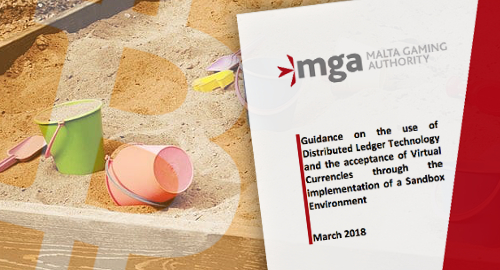 Malta’s gaming regulator has finalized plans to launch a ‘sandbox’ test of distributed ledger technology that could pave the way for online gambling licensees adding crytpocurrencies like Bitcoin to their list of payment options.
Malta’s gaming regulator has finalized plans to launch a ‘sandbox’ test of distributed ledger technology that could pave the way for online gambling licensees adding crytpocurrencies like Bitcoin to their list of payment options.
Last September, the Malta Gaming Authority (MGA) announced that it had enlisted auditing firm PricewaterhouseCoopers (PwC) to help orchestrate a “sandboxed test environment” that will determine what benefits and risks the use of cryptocurrencies might offer/pose to Malta’s gaming sector, which contributes 12% of the country’s GDP.
On Thursday, the MGA announced that the test would commence in Q2 and continue for six months, although the MGA noted that the duration is subject to change. But first, the MGA is inviting stakeholders to participate in a consultation over the parameters of the sandbox test. Interested parties need to submit their views by April 30. (The full document can be viewed here.)
While the test will focus on established cryptocurrencies, the MGA says it will also evaluate operator-generated tokens on a case-by-case basis.
To accept a crypto deposit from a gambler, operators will have to verify that the wallet address is specifically tied to the individual. All wallets need to be registered with a gambler’s account, and withdrawals to non-registered wallets will be forbidden (with rare exceptions). The general principle is that gamblers should have only one wallet address per cryptocurrency.
Gamblers won’t be allowed to exchange one currency (fiat or crypto) for another within the operator’s ecosystem. This doesn’t apply to operators that offer bespoke tokens, although withdrawals of said tokens will have to be converted back to fiat before leaving the ecosystem. Generally, deposits in one currency can only be used to wager via that same currency, and withdrawals must be made in the same currency.
To deal with potential volatility in the value of cryptocurrencies, operators will need to establish separate player-specified deposit-, wagering- and loss-limits than those that apply to fiat currencies. For purposes of the sandbox text, the MGA is capping deposits and wagering in cryptocurrencies at the equivalent of €1k per month.
However, given the unpredictability of crypto volatility, the MGA’s summary includes a variety of diagrams to assist operators in determining whether or not a customer has breached his/her maximum deposit amount, as well as the accepted procedure for operators to determine acceptable deposits from external wallets.
The sandbox will also include games that are either fully or partially hosted on a blockchain environment, as well as games that are hosted on operators’ servers but which use distributed ledger technology to maintain transparency and prove the fairness of these games.
Additionally, the sandbox will consider the use of smart contracts, provided player wallets are verified, player-specified limits and maximum amount criteria are adhered to, and there are provisions for voiding the contract should a flaw in the underlying technology be exposed.
Operators participating in the test will need to observe all standard anti-money laundering (AML) protocols. The MGA announced the formation of a new AML unit last month.
The MGA isn’t alone in seeking to embrace the cryptocurrency wave. For a couple years now, the UK Gambling Commission has allowed its licensees to incorporate virtual currencies into their payment options, provided they observe the same rules on AML and social responsibility.